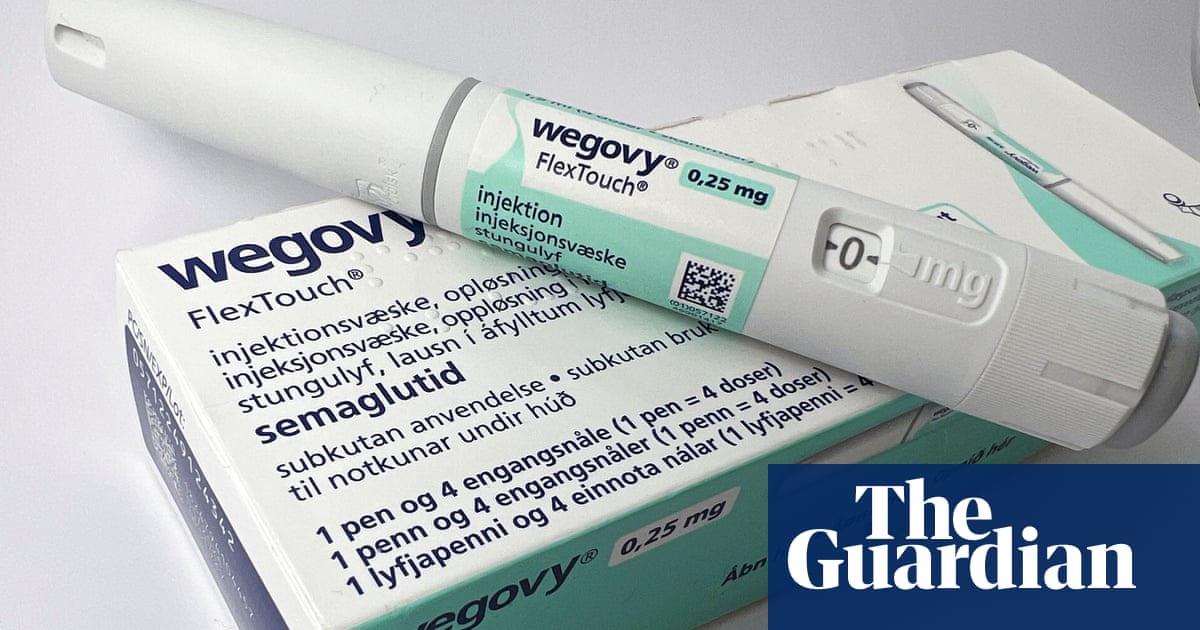
Spiralling healthcare costs and productivity losses from the global obesity crisis far outstrip the cost of new weight-loss drugs, according to a report, which also calls on governments to prioritise prevention by promoting a healthy diet and exercise.
In the UK, Germany and the Netherlands, there is a clear economic case for these medications, the report says, as the annual cost of the diabetes drug Ozempic is lower than the cost of additional healthcare needed by people with obesity. The cost of the weight-loss injection Wegovy is higher, but still dwarfed by the overall economic cost to society of obesity, according to the research by ING Bank, shared with the Guardian.
Both drugs, made by the Danish pharmaceutical firm Novo Nordisk, have been hugely popular, along with the US company Eli Lilly’s Zepbound and Mounjaro. Given as weekly injections, they act like a gut hormone known as GLP-1 that makes people feel fuller, helping them to lose weight. Recent studies have also shown other health benefits.
Obesity rates have risen sharply in the past decades, and there are now more overweight than malnourished people worldwide. The new wave of GLP-1 drugs can help reverse this trend, although there are questions over how long-lasting their effects are. They also come with a hefty price tag, in particular Wegovy.
Obesity is linked to health issues such as cardiovascular diseases, joint problems and diabetes, all of which are costly to treat.
The ING healthcare analyst Diederik Stadig has calculated that the overall cost of obesity to the UK is £100bn a year, with £19bn borne by the NHS. The healthcare costs are equivalent to €1,700 (£1,400) per person every year, compared with €2,400 in Germany, €2,300 in the Netherlands and €2,500 in the US.
A year’s supply of Ozempic, which is also prescribed for weight loss, costs £830 in the UK, while Wegovy costs £2,760 a year. This compares with €1,100 for Ozempic in Germany and the Netherlands, and €10,100 in the US. A year’s supply of Wegovy costs €3,500 in Germany, €3,200 in the Netherlands and €14,500 in the US. The US generally pays higher prices for drugs.
The analysis is based on the list prices, which are often higher than the actual prices paid.
Healthcare costs represented roughly a quarter of the overall cost of obesity to society, which included economic productivity losses and personal costs to people with obesity, such as additional transportation, clothing and adapted living facilities, Stadig said.
“If the drugs are effective long term, people lead healthier lives, there will be less productivity loss, less private cost, higher quality of life … if you can nip obesity in the bud for a significant amount of people, you could save people so much discomfort, but you could also save society money,” he said.
People living with obesity are up to twice as likely to take time off work, according to recent research from the Institute for Advanced Studies in Vienna across 26 European countries.
“Obesity can lead to more than 80 illnesses, from depression to heart attacks,” said Thomas Czypionka, the head of the health economics and health policy research group at the institute. “Obese people take more sick days. Across Europe there are labour shortages; it is a huge problem for economies.”
He predicts prices of obesity drugs will fall in coming years, when more medications come on to the market, but for now governments will have to prioritise those most at risk.
Stadig cautioned that the long-term effects of the drugs were uncertain. One study found that once individuals stopped taking semaglutide, the active ingredient in Ozempic and Wegovy, they regained two-thirds of their weight within a year. The drugs come with side-effects such as nausea and stomach pain and many people quit them after a while..
While doctors tend to only prescribe weight-loss drugs alongside a diet and exercise plan, governments need to do more to combat obesity, Stadig says. He suggested using VAT as a tool to promote healthy eating, charging no or little VAT on vegetables and placing a higher tax on fast food.
Several celebrities have discussed their use of Semaglutide, including Australian actor Rebel Wilson who briefly tried Ozempic to maintain her weight after losing six stone through diet changes and exercise, broadcaster and actor Stephen Fry, who revealed it made him vomit up to five times a day, and TV personality Sharon Osbourne, who told the Guardian in February she had lost three stone in four months through injecting herself with Ozempic, and now struggles to put weight on.












